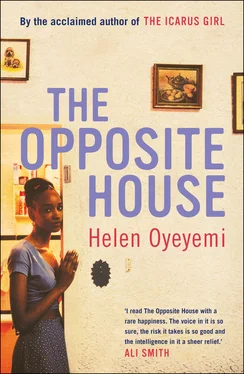Helen Oyeyemi - The Opposite House
Здесь есть возможность читать онлайн «Helen Oyeyemi - The Opposite House» весь текст электронной книги совершенно бесплатно (целиком полную версию без сокращений). В некоторых случаях можно слушать аудио, скачать через торрент в формате fb2 и присутствует краткое содержание. Год выпуска: 2008, Издательство: Bloomsbury UK, Жанр: Современная проза, на английском языке. Описание произведения, (предисловие) а так же отзывы посетителей доступны на портале библиотеки ЛибКат.
- Название:The Opposite House
- Автор:
- Издательство:Bloomsbury UK
- Жанр:
- Год:2008
- ISBN:нет данных
- Рейтинг книги:4 / 5. Голосов: 1
-
Избранное:Добавить в избранное
- Отзывы:
-
Ваша оценка:
- 80
- 1
- 2
- 3
- 4
- 5
The Opposite House: краткое содержание, описание и аннотация
Предлагаем к чтению аннотацию, описание, краткое содержание или предисловие (зависит от того, что написал сам автор книги «The Opposite House»). Если вы не нашли необходимую информацию о книге — напишите в комментариях, мы постараемся отыскать её.
The Opposite House — читать онлайн бесплатно полную книгу (весь текст) целиком
Ниже представлен текст книги, разбитый по страницам. Система сохранения места последней прочитанной страницы, позволяет с удобством читать онлайн бесплатно книгу «The Opposite House», без необходимости каждый раз заново искать на чём Вы остановились. Поставьте закладку, и сможете в любой момент перейти на страницу, на которой закончили чтение.
Интервал:
Закладка:
He told me, without embarrassment but without ease, that he wore my perfume so that he could smell me sometimes. He tilted my face so that I met his eyes squarely, and he said, ‘Do you think that’s creepy?’
I said, ‘Is it a habit, wearing girl’s perfume?’
He said, ‘Shut up, it’s not,’ and the way he said it and the way he looked at me then made me think that he was trying to get to me before I could get to him, as if it was some kind of race.
Later I examined myself from four different angles in the mirror and thought, Why? Am I dangerous? Does the hysteric show? I don’t shine like my mother does. I am not a pretty princess. We went out for cocktails and at the bar he spun my stool under me. All I could think of was contact, the static inches between his hand and my thigh. It was like a Peggy Lee song, smoky joy; what to order — cyanide or champagne? Anyway he got to me first, he definitely got to me first.
Aaron is different when he’s at the hospital; brittle, swift — the rare times that we actually get to talk while he’s there, his words tumble over each other.
It is so late. He has Jung’s The Archetypes and the Collective Unconscious on his lap, and once I’ve chosen another cassette and put it into the video player, I slide the book onto the arm of the sofa so that I can take its place.
‘You’ve been reading this book for about two years,’ I tell him.
He shrugs and nuzzles my cheek. ‘You should see it as a pleasing example of fidelity,’ he says. ‘What you don’t notice is that it’s not that I’m getting through it slowly, but that I’m reading it over and over and not getting bored.’
The tape flickers and stalls, flooding the television screen with fine-grained grey; I get up to try the tape again, which involves giving the video player a thump with my fist. The problem with living in the basement half of a thick-built house is that everything works slightly less well: the radio has a scratchy signal; the television — aerial or no aerial — is temperamental about which channels it will let us see clearly; and the light is poor — our only windows are high and emerge at street level.
The sitting room is lined with lanterns and glass-bubble lamps that radiate purple ultraviolet light. They are gifts from Aaron’s mother, who is certain that we’ll get depressed because we don’t have access to sunlight. She keeps telling us that we should swap with Miss Lassiter. Aaron doesn’t say anything when she starts on this topic, and his silence is his papal stamp, his way of saying no-not-ever. He doesn’t believe that Miss Lassiter would survive a lack of light.
I join Aaron on the sofa again; the tape stalls again. Aaron, his head lolling against the back of the sofa, tuts drowsily with his eyes hooded, and I lay my head on his chest and let the video whir and click.
I ask him why he won’t just go to sleep — he says he doesn’t know.
I know that I am going to tell him. I rehearse phrases in my head. I must not say ‘my son’, I must say ‘the baby’. When I say it he takes my face in his hands, drapes me in a believer’s smile. He doesn’t look at me the way Amy Eleni looked at me. His questions, his voice — so happy.
A tape recording of the St Peter Oratorio with Aaron’s name listed on the box revealed that he sang tenor at his stiff-collared Schola Cantorum in Accra. After he found himself settled in London, but before he became a junior house officer and had to decide between hymns and extra sleep, he joined the choir of St Meredith’s, a small church with bobbled grey gables.
I couldn’t get my head around Aaron’s ability to sing because I never heard him sing alone — if, burrowed into the beanbag on the floor of his room, I started singing, he’d chime in. But when I slyly dropped out of the melody, he stopped dead and grinned, made false beginnings of notes to make me sing first. So in my final two terms at university, I made a regular point of going to his Saturday rehearsals. It was a big choir for a small space. Aaron was dwarfed week after week by two broad-shouldered bass singers in knitted jumpers. He looked childishly healthy; dark hair, pale skin, a warm flush over his cheekbones. And he maintained the pursed-lip style of singing of much younger choirboys — eyes wide, troubled by God, the Latin lyric, or both.
One Saturday, in a week when November died amidst wet weather and frosted leaves, I arrived ten minutes into the rehearsal. I was tracking mud into the church, trying to be as quiet as I could considering I had my arms wrapped around a forty-by-forty-inch piece of sandalwood that scraped the floor. Having accepted that, despite Amy Eleni’s best efforts, I was almost certainly going to fail my degree, I’d decided to go out with belligerence and submit both my dissertations on wood, in tiny biro letters — the first dissertation on one side of the block and the second on the other.
My arms had shaken as I bought the wood; they juddered all the way to the church, and I believed that I would be trembling until I handed the thing in. Part of me thought I could still save my degree if I behaved myself and played to the system. One of my teachers at Sacré Coeur, upon being asked whether he thought exam passes could be obtained through diligent prayer, had looked as if he was thinking very hard and then said, ‘Yes.’
I half-sat, half-fell into a pew. The choir and their director, a sister in a blue and cream habit, ignored me. Aaron’s voice soared, naked, clear, but unsure of its strength:
Veni, veni Emmanuel ,
Captivum solve Israel!
The others rose a beat later and clustered his tinsel call, and I felt December coming with footsteps that shook the pavements, and all Decembers before, and the way that, at Midnight Mass, Christmas sometimes seems so sad to me, a giant bedecked with crosses and stars and berries and robins frozen to death.
Qui gemit in exilio ,
Privatus Dei Filio .
Gaude, gaude! Emmanuel
Nascetur pro te, Israel .
When the rehearsal had finished, Aaron came over, slightly shamefaced, and I hugged him until he wheezed because he was more beautiful to me for having raised his voice alone.
‘I know why you don’t like to sing in front of me,’ I said in his ear. He put his arms around my shoulders and drove me out into the street before him.
‘Because I’m not very good?’ he hazarded, as if the reason I was trying to guess was not his own.
‘Nope.’
‘You tell me then.’
‘Because you look and sound exactly as if you really mean it, as if you believe in every word.’
Aaron said politely, ‘Is that right?’ and burped, and I screamed ‘disgusting’ and stamped in a puddle to splash his windbreaker. We stood at the bus stop, looking out into brown slush and crawling traffic, and, because he knew that I was still shaking with cold, he opened up his wind-breaker and drew me in against his chest and buttoned us both up into it. There was room for him, me and my sandalwood under that monster of a coat, and there was his heart. It was kicking in his chest, so strong and steady I felt it pushing me. By the time he said, ‘Stop it,’ I had been lulled into such confusion that I thought he was talking about his heartbeat. That wasn’t it; he wanted me to stop standing on his feet. That was why I had been feeling so tall.
8 peaces
To escape Proserpine, Aya slips through the Lagos door of the somewherehouse and hurtles through faded green rooms, past speckled electrical fans that wheeze dust; she bangs the mosquito-netted screen door of the Lagos house open as she bursts out. It must be a Sunday; she shoulders her way through throngs of church-dressed women hastily swapping ornate hats for headwraps to balance trays packed with fried and baked wares. They head for the motorways, to swarm at the sandy sides. Lithe, chirpy boys with baskets of bread and popcorn flock around cars stopped by other cars, tin beads in a necklace of traffic.
Читать дальшеИнтервал:
Закладка:
Похожие книги на «The Opposite House»
Представляем Вашему вниманию похожие книги на «The Opposite House» списком для выбора. Мы отобрали схожую по названию и смыслу литературу в надежде предоставить читателям больше вариантов отыскать новые, интересные, ещё непрочитанные произведения.
Обсуждение, отзывы о книге «The Opposite House» и просто собственные мнения читателей. Оставьте ваши комментарии, напишите, что Вы думаете о произведении, его смысле или главных героях. Укажите что конкретно понравилось, а что нет, и почему Вы так считаете.












